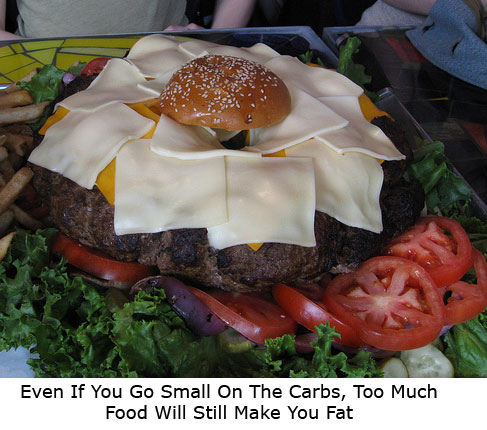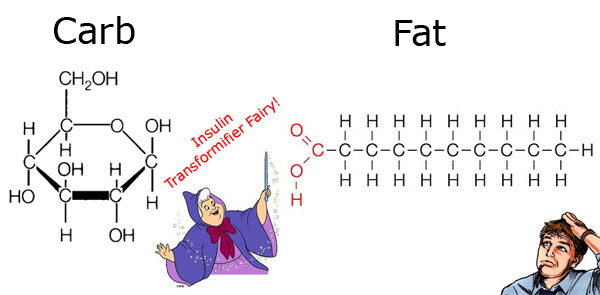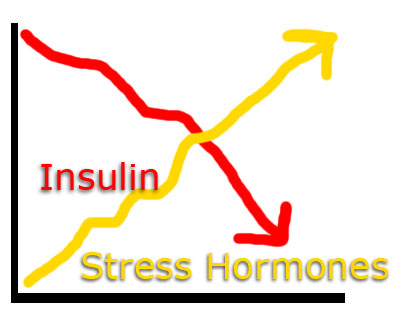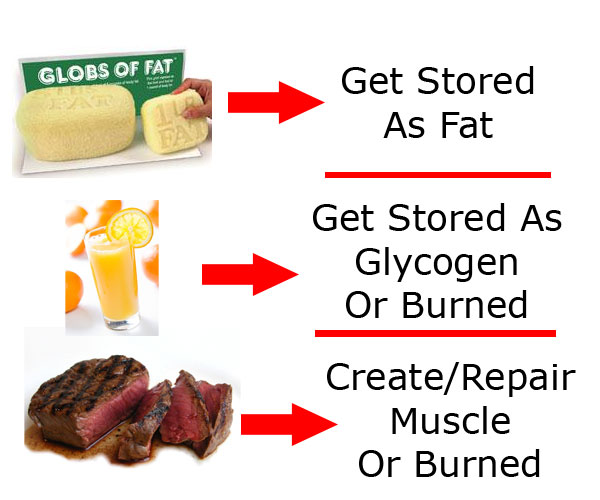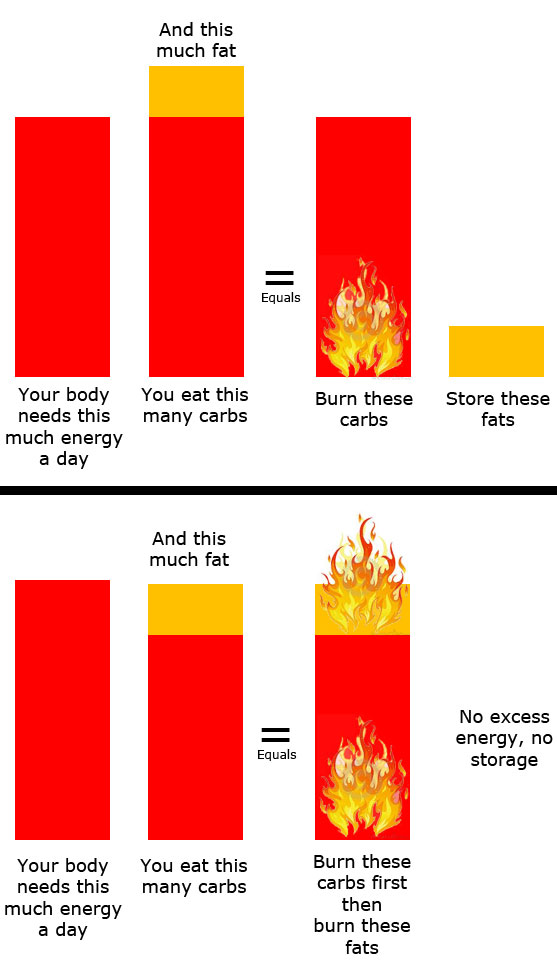It’s one thing to know how to burn fat, and gain muscle based on practical advice like… Avoid this food, eat that food, keep your calories at a specific level. Exercise in this way, blah blah blah.
But it’s a completely different thing to actually know *why* what you’re doing is working, or not working.
Not knowing what is actually going on behind the scenes leads to dysfunctional dieting behavior, crazy theories, and all sorts of wacky stuff going on that confuses the heck out of people. Myself especially!
Finally, after 10 years of wading through college courses, “bro-science”, anecdotal evidence, countless blogs, too many youtube videos, head-dizzying studies, and many heated debates, I think I’ve finally decided on a theory that makes a lot of sense as to why and when we store fat. And it’s super-duper why-couldn’t-I-accept-it-was-so-obvious simple.
I even *knew* this stuff, but then convinced myself it couldn’t be that easy and there had to be something else going on, so I unlearned what I learned, then went around in circles for a couple years. Then one dark and dreary, rainy Seattle night, after getting super honest with my nutrition demons, I went into my bedroom, stared in the mirror, locked eyes with my stone-gazed reflection, took my hand, wound up, and SMACKED some sense back into my brain. Hopefully I smacked myself so hard the smack will transfer over to you too once you read this page.
I want to preface this by saying that everyone is different, and the theory below is based on a fairly “normal” person, minus any genetic abnormalities, or actual real medical conditions.
Here it goes.
Weight gain really is about energy balance. Eat too much and you gain weight, eat too little and you lose weight. That’s a gross oversimplification of things, and depending on what you eat, a lot of different things happen in your body to make that happen. But at its’ core, it’s really about energy in vs. energy out.
And while that’s most likely true, that is not enough of an answer for me, and I want more information as to *why* it’s an energy in vs. energy out equation. So if you’re like me, you may want to keep reading as I’ll try and break down the reason behind why that happens. And yes, you’ll gain fat if you eat too much regardless of if you eat only protein, only carbs, or only fat. Or any combo of those.
Let’s get one thing out of the way first.
Many people (myself included in the past) think that eating carbs increases your insulin and shuttles those carbs into your cells therefore creating fat. And making you fat as a result.
I feel totally crazy for believing that now, and I really can’t tell you why I did believe it.
Because think about it, how is your body creating fat from carbohydrates? That’s a pretty complicated and energy intensive process, and if you look into the studies behind it, that conversion from carbs to fat rarely happens, if ever.
That conversion is called de novo lipogenesis and it’s super tough for your body to do, and it’s pretty much not going to do it unless your glycogen stores (stored carbohydrates in your cells) are maxed out and you’re getting a huge buildup of energy in your cells. That basically means you have to OVEREAT like CRAZY to turn carbs into fat, and even if you do make that conversion, it’s not a big one. Certainly not significant enough to actually cause any fat gain to worry about by itself. But I doubt you’d ever even run into much de novo lipogenesis in your body anyhow.
So insulin probably doesn’t actually *cause* fat gain by turning carbs into fat. But insulin is a very anabolic substance, meaning that it helps build stuff bigger. For example, it helps make protein from amino acids, and it helps shuttle glucose and fat into cells. And while insulin is around, usually that means it’s pushing stuff into your cells, not taking it out. (Making you bigger, not smaller.)
Basically insulin is a way for your body to say “I just ate a meal! I should store these nutrients or use ’em!” (Fat alone doesn’t seem to increase insulin, but unless you’re drinking straight fat you don’t have to worry about this little exception.)
Once there’s no more stuff to digest in your system your insulin levels will most likely go down and then that’s basically your body saying “Uhhh, man, we don’t have anymore stuff to eat right now, but I still want energy to like, move around ‘n stuff, and maybe think with my brain once in awhile.”
So while your body has already stored or used the energy from the food you ate previously, you still need energy to function. How are you going to get that energy?
You’re going to need to get it from eating more food, or you’re going to need to get it from the stored fuel in your cells from previous meals.
When you don’t have lots of food digesting in your system any longer, then your insulin levels (and probably glucose levels) will go down, and that’s the whole “Uhhh we don’t have stuff to eat anymore.” response.
But your body still needs energy, and the way to get that energy without eating more food is to increase “stress hormones” like glucagon and cortisol which break down your tissue to get energy from your cells. You’ll most likely be grabbing stored carbohydrates (glycogen) and stored fat from your cells.
Your body can then use the free fatty acids from the fat to create energy, and the glucose from the glycogen to create energy.
So right after you eat a meal you’re using the energy from the meal to live on, and you’re also storing some of that energy for in between your meals.
In between those meals you’re taking energy from your own cells to live on (making you smaller, not bigger.) And essentially “losing weight” in the process.
Here’s a few key points:
- Carbs don’t get converted into fat in almost all cases.
- Protein doesn’t get converted into fat either.
- It seems that the more carbs you eat, the more carbs you burn, and the more protein you eat, the more protein you burn.
- The amount of fat you burn seems to depend on the amount of carbs you eat.
- Almost all the fat that you eat from a meal gets stored as body fat, at least temporarily.
When you eat fat it gets shuttled right into your cells through insulin or through another possible mechanism called ASP. You can use that fat for energy later, but it gets stored first in almost all cases.
Here’s where the “how you get fat” part comes in.
If you eat enough carbs to run your day-to-day activities on, your body has no need to burn anything else and doesn’t want to.
So if you eat 20 grams of fat, and then follow that with enough carbs to meet your daily energy requirements, then you’re going to keep that fat in your body. (Although 20 grams isn’t very much, you get my point.)
Basically, carbs prevent fat from being used as energy because your body would prefer carbs as an energy source. And if you have enough carbs to cover your energy needs, any fat you eat will be stored and kept around.
That’s basically it.
If you keep your carbs moderate however, then there will most likely be a point where your body needs extra energy and doesn’t have it, insulin will lower and then your body will start taking energy from its’ reserves, and fat is one of those reserves.
The same will most likely happen if you’re eating enough protein to cover your energy needs and then eat fat on top of that as well. Because, your body will store the fat, and then use the protein by using the amino acids and turning that into glucose and fulfilling your energy needs.
If you eat enough fat to fulfil your energy needs, and then eat more fat on top of that, then you’ll store the fat, then use it for energy during the day, and then keep the extra fat as stored energy.
There’s no way around it. Any excess energy intake will create fat gain as long as you’re eating any dietary fat.
And even if you’re not eating fat… It seems that at under about 10% dietary fat, then that whole de novo lipogenesis gets ramped up, goes into overdrive and helps you create fat from other sources, which would still make you most likely gain fat. But without dietary fat, you’d probably die. Also, I challenge you to find a way to actually eat a diet with no fat. (Not really, please don’t try that, but you get my point.)
But I can already hear you saying “But Sean, I lost a ton of weight on a low carb diet, how do you explain that?” I’d say that it’s probably due to you reducing calories and not noticing.
Cutting out carbs makes it difficult for most people to find meals at restaurants and recipes they enjoy cooking back home. That usually leads to eating less calories on average, because let’s face it, if you tell your waiter to “hold the rice” on the meal you just ordered, you don’t also tell them to “increase the fat.” So by cutting anything out, you’re also cutting out calories. Low carb also usually ends up being high protein, and protein is very difficult to overeat with. I mean try eating 1,500 calories worth of steak, it’s not easy. That by itself is a limiting factor in the number of calories you’re likely to take in. (I’d like to add that this initial “I can’t find stuff to eat!” effect tends to wear off, and people hit a plateau, or actually start gaining weight in many cases once they get in the groove and figure out convenient stuff they like to eat and their calories go up again.)
So in conclusion, there’s just no way around the whole energy balance equation. There’s little tweaks here and there you can do, but without the basics you’ll never get anywhere. And deluding yourself into thinking not eating carbs, or not eating fat, or not eating protein is the key to losing weight is just plain confused thinking.
Find out the 3 Forgotten Keys To Fat loss here: https://seanbissell.com/burnfat/
